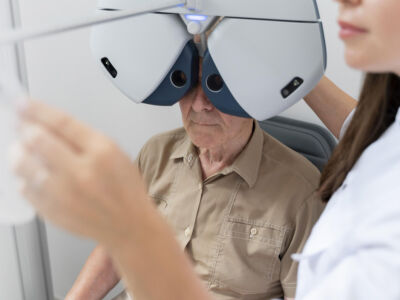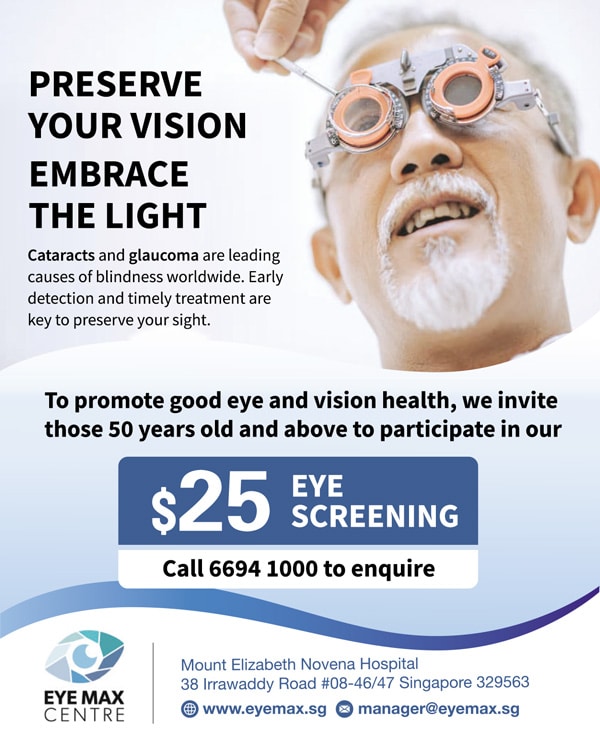Understanding Cataracts and Their Impact: Vision, Lifestyle, and Surgery Fees in Singapore
How Do Cataracts Affect Older People?
What are cataracts?
Cataract is an age-related medical condition where the crystalline lens in the eyes turns cloudy or becoming more opaque. Without treatment, cataracts can cause blindness. According to World Health Organization (WHO), cataract is known as one of the major causes of vision impairment globally. There are 3 main types of age-related cataracts:
Nuclear sclerotic cataract – forms at the centre of the crystalline lens
Cortical cataract – forms at the side (outer edge of the lens cortex)
Posterior sub-capsular cataract – forms at the back of the crystalline lens just beneath the lens capsule

Visual impact of cataracts
Cataracts mostly affect the vision of older people (those 45 years and above). Some common visual effects of cataracts:
- Blurred or hazy vision: Similar to looking through a foggy window. This makes it difficult to see fine details or read small print.
- Reduced colour perception: Affects the ability to see colours accurately as they may appear tinted, faded or less vibrant.
- Sensitive to glare, bright light or headlights: Can cause discomfort and challenging to see clearly.
- Difficulty seeing in low light environment or at night
- Double vision or multiple images: Affects depth perception and makes it difficult to judge distances accurately.
- Frequent changes in spectacle prescription: Vision may change requiring frequent updates to the glasses prescription.


Impact on quality of life
Physical: Difficulty performing daily tasks such as cooking, cleaning or driving with impaired vision. The reduced ability to see and navigate around can make doing simple tasks more time consuming and frustrating.
Emotional: The loss of visual clarity can lead to helplessness and a decline in overall well-being which can lead to depression.
Social isolation: Cataracts can impair vision, making it hard to recognise faces, read facial expressions or see non-verbal cues during conversations which can lead to difficulties in social interaction and may cause those with it to withdraw from social situations.
Decreased independence: May require assistance from family members with daily tasks and mobility. This can impact people’s sense of independence and may lead to feelings of burden.
Increased risk of falls: Harder to see changes in elevation such as steps, curbs or uneven surfaces which can lead to height or depth misconception and increase the likelihood of falls. It can also reduce peripheral vision, which limits the ability to see objects or people in the side vision.
Cataract surgery fees in Singapore
Presently, the only effective method to treat cataract is through cataract surgery. Current advances in cataract surgery promise faster recovery and lesser discomfort post-surgery making it one of the most common and successful eye surgeries performed worldwide.
It is good to be aware of Cataract Surgery Costs in Singapore to make well-informed decisions about your eye health and the fees related to cataract surgery. The fees for cataract surgery vary in Singapore depending on whether you have it done at a public hospital or a private eye centre. At private eye centres, the fees can be from $5,500 to $11,000 per eye depending on the experience and seniority of the cataract surgeon, the type of intraocular lens chosen and the complexity of the surgery.
For Singaporeans and Permanent Residents, MediSave can be utilised for cataract surgery, up to $2,450 per eye. In addition, cataract surgery is also insurance-claimable; the amount claimable is subject to an individual policy. Do check with your insurance provider on your coverage.

Consult a cataract specialist
If you are experiencing poor vision or suspect you may have cataracts, contact us at manager@eyemax.sg or +65 6694 1000 to schedule a cataract screening.

